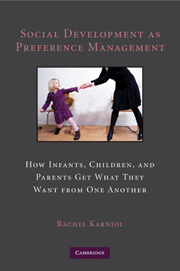 Social Development as Preference Management
Social Development as Preference Management Book contents
- Frontmatter
- Contents
- Acknowledgments
- Introduction
- 1 The Baby “Preference Game”
- 2 Children's Expression of Preferences
- 3 Emerging Meta-Preferences
- 4 Other People's Preferences
- 5 Parenting and Preference Management
- 6 Channeling Children's Preferences
- 7 Temporizing Preferences
- 8 Restricting Children's Preferences
- 9 Disciplining Noncompliance
- 10 Planes of Transformational Thought: Temporal, Imaginal, and Mental
- 11 Manipulating Others
- 12 Coping and Self-Regulating
- 13 Mind Play: Applying Transformational Thought
- 14 Minding One's Own Versus Others' Preferences: Altruism, Aggression, and Morality
- 15 Tying Up
- References
- Subject Index
- Name Index
12 - Coping and Self-Regulating
Published online by Cambridge University Press: 05 June 2012
- Frontmatter
- Contents
- Acknowledgments
- Introduction
- 1 The Baby “Preference Game”
- 2 Children's Expression of Preferences
- 3 Emerging Meta-Preferences
- 4 Other People's Preferences
- 5 Parenting and Preference Management
- 6 Channeling Children's Preferences
- 7 Temporizing Preferences
- 8 Restricting Children's Preferences
- 9 Disciplining Noncompliance
- 10 Planes of Transformational Thought: Temporal, Imaginal, and Mental
- 11 Manipulating Others
- 12 Coping and Self-Regulating
- 13 Mind Play: Applying Transformational Thought
- 14 Minding One's Own Versus Others' Preferences: Altruism, Aggression, and Morality
- 15 Tying Up
- References
- Subject Index
- Name Index
Summary
A 12 year old explains, ‘If you are really upset about something you don't really forget about it that easy…you are thinking about that thing most of the time. So it is real hard to forget about it.’
(Selman, 1979, p. 82)In many contexts, other people, primarily parents and teachers, impose their external preferences on children and prevent them from pursuing their preferences. In other contexts, others may be unwilling to yield to children's expressed preferences. Except for voicing their own preferences or attempting to alter parental injunctions – strategies that were addressed in previous chapters – children need to learn how to cope with contexts in which others have set up preference blockage. In addition, children eventually develop second-order preferences that lead them to impose barriers on their own preferences and preference-seeking behavior, engaging in self-regulation to do so. In this chapter, I discuss children's strategies for coping with preference blockage, contexts in which others prevent children from either temporarily or permanently pursuing their preferences, as well as the psychological processes involved in self-regulation in which children put the brakes on their own preferences for the benefit of their own second-order preferences.
EXTERNALLY VERSUS SELF-IMPOSED DEMANDS FOR SELF-CONTROL
The strategies children use to cope with preference blockage are generally discussed under the umbrella term self-control. But this umbrella covers two different contexts in which self-control is required: coping with externally imposed demands and self-regulation. When others thwart preference attainment and impose demands for self-control, coping is required.
- Type
- Chapter
- Information
- Social Development as Preference ManagementHow Infants, Children, and Parents Get What They Want from One Another, pp. 244 - 268Publisher: Cambridge University PressPrint publication year: 2010
